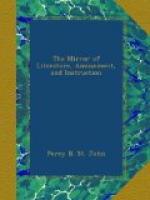W.G.C.
* * * * *
TAILORS.
Sir John Hawkwood, (the first English general,) was usually styled Joannes Acutus, from the sharpness, it is said, of his needle or his sword. Fuller, the historian, says, he “turned his needle into a sword, and his thimble into a shield. He was the son of a tanner, and was bound apprentice to a tailor, and was pressed for a soldier.” He served under Edward III., and was knighted, distinguished himself at the battle of Poictiers, where he gained the esteem of the Black Prince, and finished his military career in the pay of the Florentines, in 1394, at his native place, Hedingham, in Essex. There is a monument to his memory in the parish church.
Sir Ralph Blackwell was his fellow apprentice, knighted for his bravery by Edward III.; married his master’s daughter, and founded Blackwell Hall.
John Speed, the historian, was a Cheshire tailor.
John Stowe, the antiquary, was also a tailor; he was born in London, in 1525, and lived to the age of 80.
Benjamin Robins was the son of a tailor, of Bath; he compiled Lord Anson’s Voyage round the World.
Elliott’s regiment of light-horse was chiefly composed of tailors; and the first man who suggested the idea of abolishing the Slave Trade, was Thomas Woolman, a quaker, and tailor, of New Jersey. He published many tracts on this species of traffic, went great distances to consult individuals on the subject, on which business he came to England, and went to York, where he caught the small-pox, and died October 7, 1772.
T.G.
* * * * *
HINTS TO COCKNEY EQUESTRIANS.
The following hints are offered “in the milk of human kindness” to all “young gentlemen” who hire a horse, or a horse and gig, to go the amazing distance of Kew or Richmond, on Sundays; and may be compelled to flog the “tired jade” the last three miles back, in order to get it home before midnight; also to prevent the annoying necessity of pulling up in a street adjacent to the livery-stables, to cut off the frayed end of the whip thong, that the ostler may not detect their flagellation.
M.A.S.
I. How to make a horse go that is utterly tired.
Dismount from thy horse and prick his sides all over with little holes with a nayle or fine awle, in the spurring place. Take then window glass and stamp it unto a subtile powder, which rub into his pricked sides; then mounting, but touch him not with the spur, and you shall have your desire, for be sure if he have any life in him he will not fayle to go.
II. Here followeth another torment.
Dismount from thy horse and get a stick, which with your knife, jag and cut like unto the notches of a saw, make then a slit with your knife in the ear of the horse, thrust therein the stick, and when you find him to tyre, by working the stick backwards and forwards in the ear, you will have your desire, for be sure if he have any life in him, he will not fayle to go.




